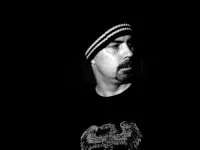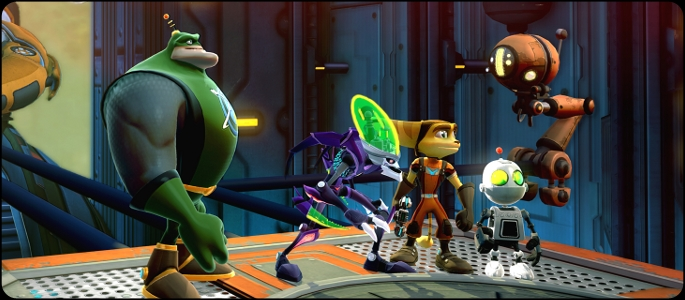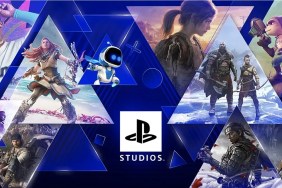Developed by Insomniac Games, Ratchet and Clank quickly became one of the PlayStation family’s most beloved series. With a score originally composed by David Bergeaud, the franchise’s music developed with each iteration, keeping to its roots, but changing as Boris Salchow took over from Bergeaud in 2009 for A Crack in Time. Upcoming co-op title, All 4 One, will once again see another musician take the reins of the series, with Oddworld composer Michael Bross set to bring his own talents to the title, while building on the work of his predecessors.
 Hi Michael, could you tell us about your work on Ratchet and Clank, and your experience in the industry?
Hi Michael, could you tell us about your work on Ratchet and Clank, and your experience in the industry?
This is the first time I’ll be working within the Ratchet and Clank universe, which I’m pretty excited about. I began work last summer on the project and am currently in production on the music. We’re planning on having over 4 hours of music in the game.
As you’re already aware, I’ve composed for some of Oddworld’s games. I’ve also been involved with everything from the games of the now non-existent Microprose (back in the 1990s) to current in-progress productions (such as Firefall from Red 5 Studios). People think of me as a composer which is where the bulk of my efforts have been in the last few years, but many don’t know I’ve also worked as an audio director and sound designer on a number of projects.
What composers most influence your music (either contemporary or non-contemporary, and either game-related or not)?
I’m influenced by a wide variety of music. There’s definitely an influence by film composers such as John Powell, Cliff Martinez, and James Newton Howard amongst others. I’m also a huge fan of classical composers like Stravinsky and Chopin, but I love a lot of other types of music just as much such as electronic music and rock.
What difficulties did you overcome trying to keep to the franchise’s roots, but still adding your own flavour?
It’s definitely important in finding that balance between respecting all the great music that’s been in the past titles while also trying to bring something new to the table. I spent a lot of time listening to already existing Ratchet and Clank music and re-playing through previous games. Absorbing those influences took some time, which is expected since the Ratchet and Clank universe has a lot of history. Naturally I’m going to bring some fresh perspectives of my own. The important thing is to make sure those approaches are still aligned and can add depth to the game’s world.
Was adding a sense of humor to the music the most important part of the score, or did you also focus on the frantic action and epic scenes that are sure to be in the title?
There’s definitely both because a Ratchet and Clank game can’t really have one without the other. I have to be thinking of both sides when writing. That’s not to say that both are always present. Sometimes epic feel is needed more than humor. Sometimes it’s the other way around.
How has co-op influenced the title’s music?
We didn’t really need to address any special issues that came out of this type of gameplay. A lot of what influences the music is the story, the environment and the anticipated action or events that take place in the game. Of course, considering the characters is essential to how the music is created, but this wasn’t problematic when creating music for gameplay.
Since Oddworld, technology has improved vastly, has this given you more control over your work?
While it’s true that audio technologies have evolved since my work on Oddworld, our technical approach is simpler in a number of ways than other projects I’ve worked on. And I mean that more from a technical standpoint and not production of the music itself. I can’t say I really have more or less control in this instance. Almost all my focus is on the music since I’m not directly involved with implementation itself, though I definitely need to have knowledge of and give input on how music is implemented. Insomniac’s audio team is handling the technical aspects of that. So, I guess in this way I gain more control through the freedom to focus on the creative aspects of the music.
Did you draw upon musical themes found in Oddworld?
Oddworld is a different franchise and I can’t really borrow themes from other properties. But if there are any similarities, it would likely be because of my general aesthetic approach to creating.
How closely did you work with Insomniac?
I’m communicating with them almost daily. I also go into the Burbank studio once every couple of weeks to play through areas of the game that I’m about to score. I’m playing through areas where I’ve already created music. This way I can decide what I need to improve upon or change in order to better align it with the game.
Does Sony offer more support than other publishers due to their ties to the music industry?
I don’t deal with Sony, really. All of my interaction is with the good people at Insomniac.








